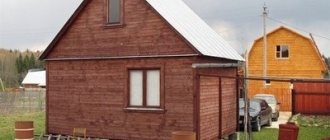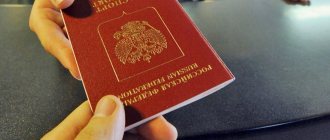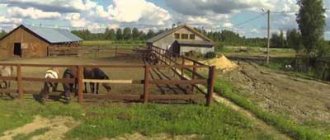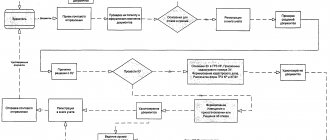Home / Real estate / Housing rights / Registration
Back
Published: 03/19/2020
Reading time: 4 min
0
1316
Having registration at the place of permanent or temporary residence is the responsibility of a citizen. But to obtain a residence permit, it is not necessary to register in an apartment: a dacha is also suitable for these purposes. In 2021, the procedure for registering citizens in country houses and gardens has been significantly simplified. If previously you had to recognize your right to register at your dacha in court, now going to court may be necessary in exceptional cases. The simplified procedure for registering in a country house will continue to apply in 2021.
- Under what conditions can you register?
- Legal regulation
- How is it determined that a dacha is suitable for permanent residence?
- Is it possible to register for a dacha if you own an apartment?
- Registration procedure
- Disadvantages of dacha registration
What is needed to register a dacha and what requirements must a dacha house meet?
Under what conditions can you register?
To obtain a residence permit or registration at the place of residence, certain requirements are imposed on a country house. Thus, you can only register in the house to which the address is assigned. If a house is built in populated areas or cottage villages on land plots with the type of use “for individual housing construction” (IHC), then all houses are considered residential. Therefore, there will be no problems with registration at your place of residence.
Certain difficulties may arise with registration in houses located on garden plots. Thus, registration in areas intended for gardening is not allowed . Registration in houses built on the plots of a garden non-profit partnership (SNT) is permissible only if a number of conditions are met:
- The plot of land must be located within a populated area with the category of “settled area land” or “agricultural land”. They won’t be able to assign an address to a house in the forest.
- The house must be registered as residential.
- The house must be assigned an address.
- The house must comply with urban planning regulations for garden plots (have no more than 3 floors, not be classified as multi-apartment).
- The house must meet the requirements for residential premises and be suitable for year-round use.
SNT Charter
The charter of the partnership must indicate:
- name of the partnership;
- organizational and legal form of the partnership;
- location of the partnership;
- the subject and goals of the partnership’s activities;
- the procedure for managing the activities of the partnership, including the powers of the bodies of the partnership, the procedure for making decisions by them;
- the procedure for admission to membership of the partnership, withdrawal and expulsion from the membership of the partnership;
- the procedure for maintaining the register of members of the partnership;
- rights, duties and responsibilities of members of the partnership;
- the procedure for making contributions, the liability of members of the partnership for violation of obligations to make contributions;
- composition, procedure for formation and powers of the audit commission (auditor);
- the procedure for acquiring and creating common property of the partnership;
- procedure for changing the charter of the partnership;
- procedure for reorganization and liquidation of the partnership;
- the procedure for providing members of the partnership with information about the activities of the partnership and familiarization with the accounting (financial) statements and other documentation of the partnership;
- the procedure for interaction with citizens engaged in gardening or vegetable farming on land plots located within the boundaries of the gardening or vegetable farming territory, without participation in the partnership;
- the procedure for making decisions at the general meeting of members of the partnership by absentee voting.
Legal regulation
Changes in the procedure for registration of registration at a dacha are now regulated by 217-FZ of 2021 “On the conduct of gardening and vegetable gardening by citizens for their own needs...” This law excludes from circulation such a concept as plots for a dacha non-profit association, as well as the very concept of “dacha”. Only two types of partnerships were retained: gardening and horticultural.
This law replaced 66-FZ of 1998, which for a long time regulated issues of gardening and vegetable gardening. Although it was possible to register at a dacha before, this was associated with large bureaucratic obstacles. In Art. 3 217-FZ emphasizes that it is allowed to grow agricultural products on a garden plot of land and place residential buildings and outbuildings on it . It is the indication of the right of citizens to build residential buildings on garden plots that makes it possible to register in them. At the same time, lands for gardeners are intended exclusively for agricultural work. Owners can grow crops here, but housing construction is prohibited here. The maximum that is allowed here is small outbuildings for storing crops or gardening tools.
If citizens who have built residential buildings receive recognition of permanent buildings, then it will be possible to register here regardless of what land the property is located on.
Registration in a country house through authorities
If a citizen nevertheless appeals to the court with a claim for registration in a country house, then it is necessary to take into account that the case will be lost from the very beginning.
It is exclusively the judicial decision taken ten years ago that encourages us to solve these problems. The judge may suddenly have the most interesting requirements for a plot of land and a dacha.
The court may make a positive decision in some cases. One of the reasons may be the fact that the citizen has already left his previous place of residence. The second reason may be the dacha, as the citizen’s only place of residence.
How is it determined that a dacha is suitable for permanent residence?
Many citizens have quite good country houses, but live there only in the summer due to the fact that the infrastructure is not well developed: in winter they do not clear snow, there is no access to communications and social facilities (shops and clinics), many houses do not have heating and etc. Therefore, it is not possible to register at every dacha. Registration in houses for seasonal residence is unacceptable.
A country house can be considered suitable for permanent residence if it meets a number of requirements . Among them:
- The house must have all engineering networks: connected to water supply, electricity, heating, drainage, ventilation, etc.
- The house must have reliable supporting structures and a roof.
- There should be windows in the rooms and kitchen to provide natural light.
- The heating system must be suitable for maintaining a temperature in the apartment of 18 degrees.
- The ceiling height in living rooms and kitchens cannot be less than 2.5 meters, in corridors cannot be less than 2.1 meters.
- The floor of the first floor must be higher than the planned ground level.
Deviations from the above standards are acceptable in some cases. For example, if there are no central communications in the area, then the water supply can be replaced with a well, the sewerage with a septic tank. But the height of such a house cannot exceed 2 floors.
How do you feel about the possibility of registering at your dacha?
PositiveNegativeI don’t knowI don’t have a dacha
Advantages and disadvantages of DNT
DNT has obvious advantages compared to other types of horticultural associations. Let's list them below:
- More favorable price for a plot of land.
- There is a greater chance of obtaining a residence permit than, for example, in SNT.
- Construction of a house does not require passing special commissions, as in individual housing construction.
- Possibility of using the common property of the partnership.
- Low utility bills.
Such areas are always safe, they are guarded, and provided with good infrastructure . However, DNT also has its limitations in use.
These include high costs for connecting communications, which the partnership will not do for free. It will not be possible to use such an object as collateral in a bank.
The construction of a permanent house, its registration, registration of registration - all this is a very long-term process, associated with a huge bureaucratic paperwork.
If desired, the owner can purchase several neighboring plots of land in the partnership to conduct large-scale agricultural activities.
Is it possible to register for a dacha if you own an apartment?
There is no need to provide proof that the house on the dacha plot is the only suitable place to live: every citizen has the right to choose where to register (in an apartment or in a dacha). If a person permanently resides outside the city, then it is preferable for him to register at his place of actual residence. This will facilitate access to social services.
But in order to obtain permanent registration at a dacha, a citizen must first register at his previous address , since having several registrations at the same time is unacceptable.
Rural mortgage at 3%
SNT tax registration in 2021
The procedure for registering SNT as a whole has not undergone major changes. The step-by-step instructions are as follows:
1. Registration of SNT 2021 begins with the need to find founders. The rules require a minimum number of founders - 7. More is possible, less is not possible 2. Management must be formed. It includes the auditor, the board and the chairman of the SNT. 3. Then select a non-residential building to register a legal address. This is a mandatory procedure for non-profit organizations. In any case, they are equivalent to legal entities. 4. Then the goals of creating SNT and types of activities are determined. 5. A package of documents is collected and submitted to the Federal Tax Service.
To understand how to register SNT, you can read the information on the official website of the Federal Tax Service or on the State Services portal. But in the end, it all comes down to collecting documents. You can submit documents for registration in person or issue a power of attorney from a notary. It is also necessary to fill out an application using the standard form P11001.
Registration procedure
To register a residence permit in a country house, you must go through the following steps:
- Have a residential premises with properly registered property rights.
- Submit an application to the Main Directorate of the Ministry of Internal Affairs for registration at your place of residence. The application must be accompanied by a passport, title information for the property (certificate of ownership or an extract from the Unified State Register), documents confirming the recognition of the house as residential (decision of an interdepartmental commission or a judicial act).
- The citizen must be registered within a week and have his passport stamped. Upon temporary registration, he is given a certificate.
In some cases, it is first necessary to transfer the house to residential status. To do this, a citizen needs to contact local authorities or the MFC. Authorized authorities must make a decision on the owner’s application for compliance with the Housing Code and its Article 23.
The application must be accompanied by a passport, title documents, floor plan, technical passport, a conclusion from the fire inspectorate or the Sanitary and Epidemiological Station on the admissibility of using the building as a residential premises (if these authorities refuse to recognize the house as residential, further appeal to local government bodies is meaningless), a conclusion from a self-regulatory organization (SRO ) in the field of construction about the technical condition of the building.
When the local government commission considers the application, it makes a decision on it. If the decision to recognize the house as residential was negative, then the citizen can go to court on this issue . To do this, a claim is filed with the court to declare the building suitable for year-round habitation.
Governing laws
Whether a citizen can be officially registered will be decided by the FMS. If the result is a refusal, the citizen has the right to appeal to the courts. In this case, it will be necessary to provide all the important reasons why you can come to a positive result. All grounds are spelled out in Decree of the Government of the Russian Federation No. 47 . In addition, you can read about changes in housing status in articles and 24 of the Housing Code of the Russian Federation.
Article 24 of the RF Housing Code
When transferring a residential space to a non-residential premises (and vice versa), they may be refused for the following reasons:
- The documents were presented to the wrong organization.
- The necessary documents (Article 23 of the Code) were not submitted at all.
- The transfer of premises was not complied with (Article 22 of the Code).
- The redevelopment of the premises was not carried out in accordance with the law.
If a refusal is received, serious reasons for this must be indicated.
When a decision to refuse is made, notification of this must be sent to the applicant three working days in advance. A citizen can appeal the result in court.
Features and nuances
If you had to go to court with a claim, you need to keep in mind that often this authority is obviously not inclined to make a decision in your favor.
Only a Constitutional Court decision in 2008 encourages him to address such issues. A judge can present the most extraordinary requirements for a residential building and site.
The fact that a citizen has been discharged from his previous address can be of great importance for the court to make a positive decision, and even more so if the dacha is his only real estate.
Judicial permission
There is a different scenario for carrying out registration than first obtaining judicial permission. You can contact the administration of the city (settlement) to which the dacha education belongs with a petition to recognize the building as residential .
There is a special commission that considers such issues. Then apply to the Main Department of Internal Affairs of the Ministry of Internal Affairs of the Russian Federation to obtain a residence permit, which will most likely be refused, since there is no court permission, and then challenge the refusal in court.
This scenario is usually used by those who have been refused by the registration authority and those who did not know that they could not do without a trial .
How is DNT different from DNP?
DNP is a dacha non-profit partnership, which differs from DNT only in the form of association . To create a DNP you need at least 3 people and a constituent agreement. For DNT, the constituent agreement is constantly supplemented by new participants when selling land.
DNP lands are specially issued by municipal authorities for farming . Within 3 years after the start of use of such land, the owner is obliged to build a house on it. There are no such restrictions in DNT. You don’t have to build anything on the land unless there is a visible need for it for the owner.
In the DNP, all lands are owned by the partnership; in the DNT, they are owned by the land owners who acquired their ownership at their own expense.
DNP lands are more expensive, because they are located in more attractive areas near populated areas. There is a developed infrastructure there; you can even get to the city by public transport.
DNT lands are located much further away; you can’t get by without a car. Hence the low price for land.
A dacha non-profit partnership is an association of owners of land plots intended for gardening.
These lands are financially attractive, suitable for building a house and year-round living. However, they are located far from populated areas and require constant payment of membership fees for their maintenance.










